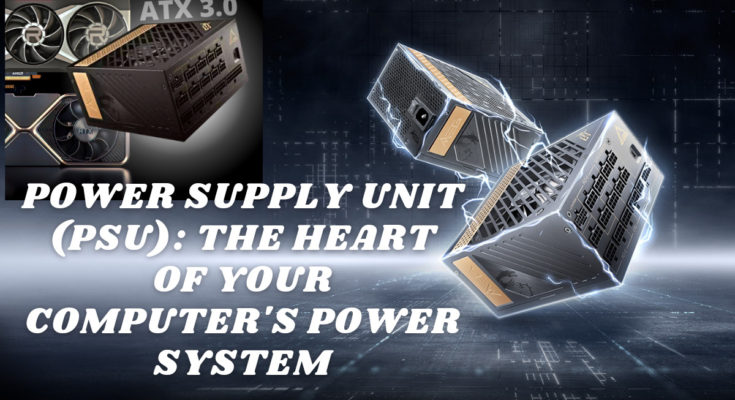POWER SUPPLY UNIT :-
A power supply unit (PSU) is an essential component of a computer that converts alternating current (AC) from a wall outlet into direct current (DC) that is used by the components inside the computer. The PSU ensures that the components receive a steady and reliable supply of power, which is crucial for their proper functioning and longevity.
A typical PSU consists of a metal casing that contains a transformer, a rectifier, and various other components. The transformer converts the AC voltage from the wall outlet to a lower voltage that is suitable for the computer’s components. The rectifier then converts the AC voltage to DC voltage, which is smoother and more stable than AC voltage. The PSU also includes various safety features, such as overvoltage protection and short-circuit protection, to prevent damage to the components in case of voltage spikes or other issues.
When selecting a PSU, it’s important to choose one that has enough wattage to power all the components in the computer. Factors that can affect the required wattage include the number and type of components, such as the CPU, GPU, and storage drives, as well as any additional peripherals that may be connected to the computer. It’s also important to choose a PSU from a reputable manufacturer that offers reliable performance and safety features.
PSU: THE HEART OF YOUR COMPUTER’S POWER SYSTEM
The PSU can be considered the heart of a computer’s power system, as it is responsible for converting the AC power from the wall outlet into the DC power that is used by the computer’s components. Without a functioning PSU, the computer would not be able to power on or operate properly.
The PSU plays a critical role in ensuring that the components in the computer receive a stable and reliable supply of power. This is important because fluctuations or interruptions in power can cause damage to the components or result in data loss. A good quality PSU can also help to improve the overall performance and longevity of the computer, as it can provide more efficient and consistent power to the components.
In addition to providing power to the components, the PSU also includes various safety features that can protect the computer from power surges, short circuits, and other electrical issues. Some PSUs also include features such as modular cabling, which can help to reduce clutter and improve airflow within the computer case.
Overall, the PSU is an essential component of a computer’s power system, and choosing a high-quality PSU can help to ensure the reliable and efficient operation of the computer.
TYPES
There are several types of power supply units (PSUs) available in the market. Here are some of the most common types:
1. ATX PSU: This is the most common type of PSU used in desktop computers. It follows the ATX form factor and is compatible with most modern motherboards. ATX PSUs come in various wattage ratings to suit different systems.
2. SFX PSU: SFX PSUs are smaller than ATX PSUs and are used in smaller form factor desktops such as mini-ITX and micro-ATX cases. They are designed to fit in tight spaces and come in lower wattage ratings than ATX PSUs.
3. TFX PSU: TFX PSUs are even smaller than SFX PSUs and are commonly used in slim desktops and small form factor PCs. They are designed to be efficient and compact and come in lower wattage ratings.
4. Server PSU: Server PSUs are designed for use in servers and other high-performance computing systems. They are typically larger than ATX PSUs and come in higher wattage ratings to support the high demands of server hardware.
5. Modular PSU: Modular PSUs allow users to detach unused cables from the PSU, which helps to reduce clutter and improve airflow within the computer case. This type of PSU is available in ATX, SFX, and TFX form factors.
6. Fanless PSU: Fanless PSUs operate silently as they do not include a fan. They are typically used in systems where noise reduction is a top priority, such as media centers or home theaters.
7. High-efficiency PSU: High-efficiency PSUs are designed to be more energy-efficient than standard PSUs. They are typically rated 80 Plus Bronze, Silver, Gold, or Platinum, depending on their efficiency levels.
When choosing a PSU, it’s important to select a type and wattage rating that is appropriate for the computer’s components and usage.



